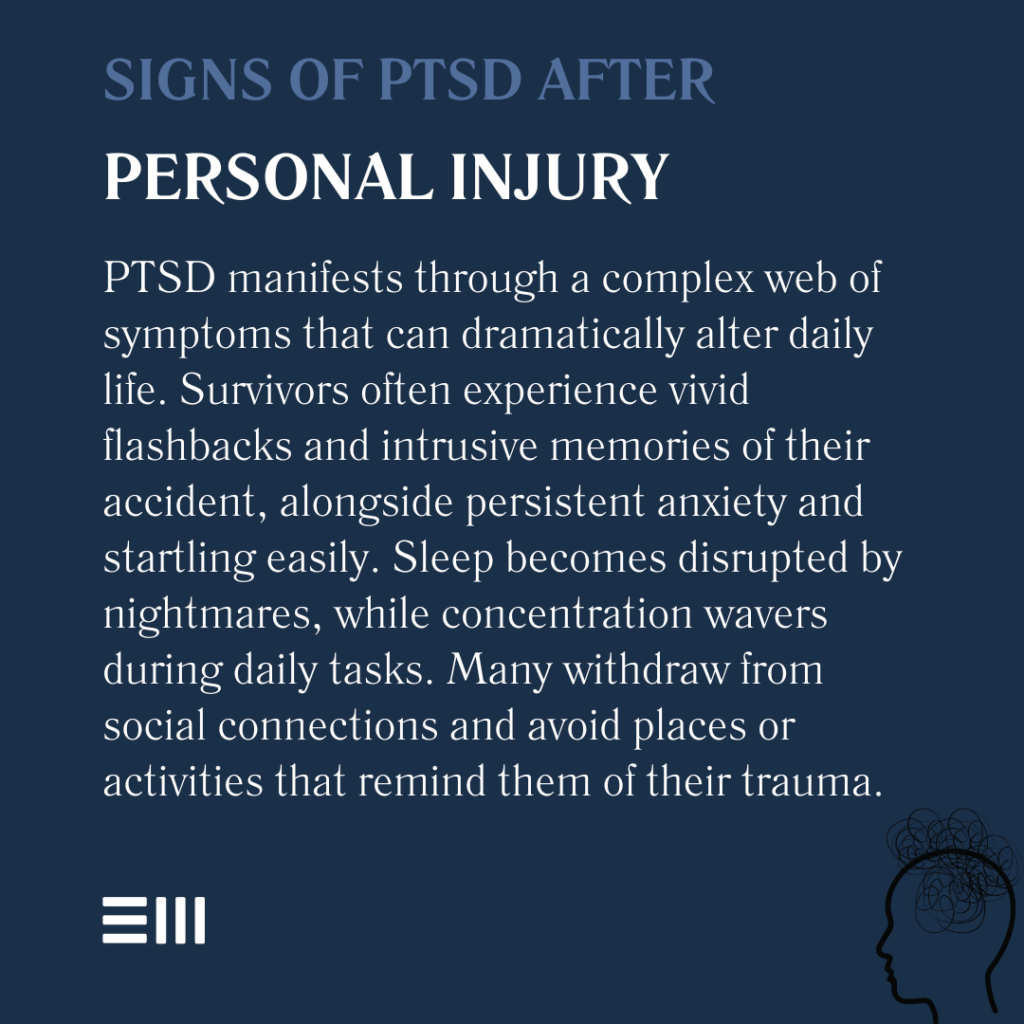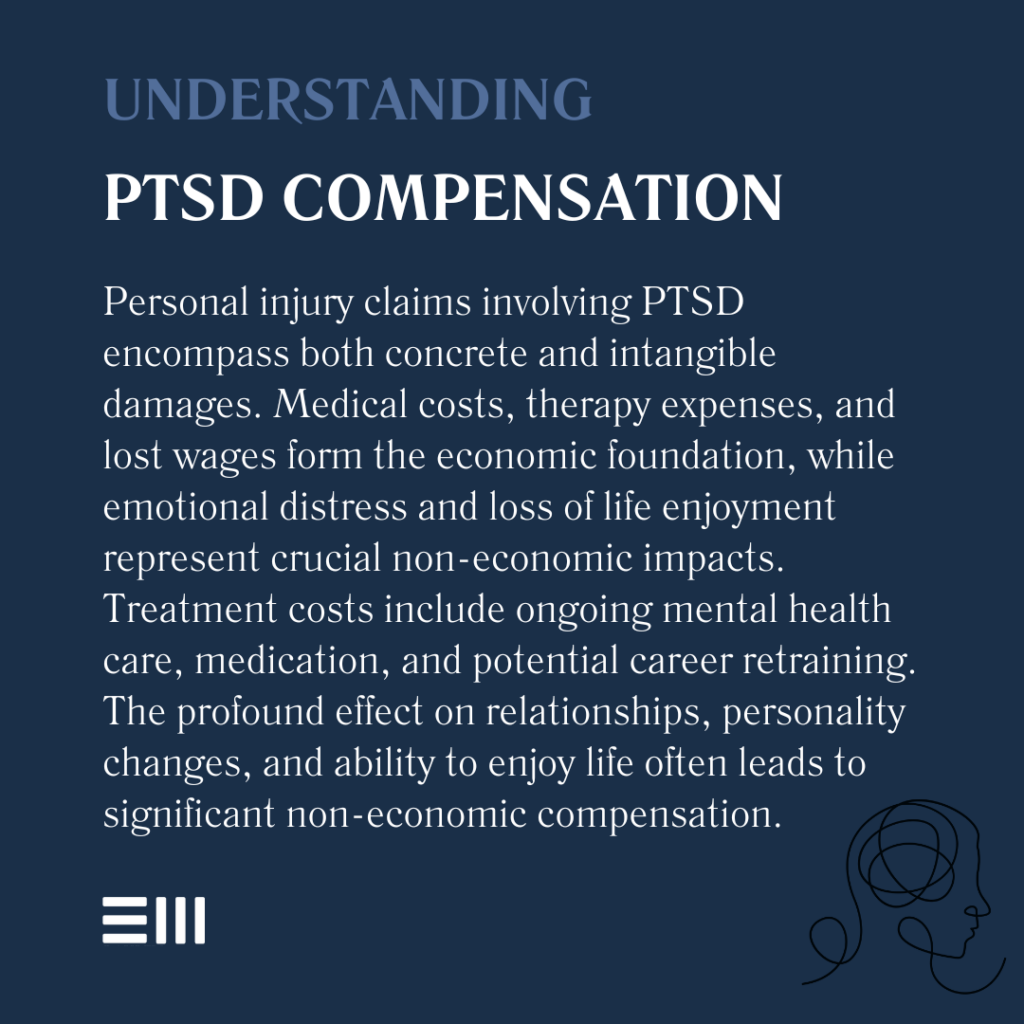
The sound of screeching tires. The smell of hospital disinfectant. The flash of emergency lights. Long after physical wounds heal, these sensory memories can continue to haunt personal injury survivors.
While broken bones and visible scars often take center stage in injury cases, the invisible wounds of PTSD can prove equally devastating.
Understanding how PTSD affects your Alabama personal injury claim could mean the difference between struggling alone and receiving the full compensation needed for true recovery.
Understanding PTSD in Personal Injury Cases
Post-traumatic stress disorder fundamentally changes how injury victims experience daily life. From car accidents to workplace injuries, traumatic events can trigger lasting psychological effects that deserve recognition in personal injury claims.
Modern research continues to reveal the profound impact of PTSD on recovery outcomes.
Common Triggering Events
Various types of accidents and injuries can lead to PTSD development.
Understanding these triggers helps establish the connection between the incident and the resulting psychological trauma:
- Motor vehicle accidents and collisions;
- Workplace accidents involving severe injury;
- Construction site incidents;
- Medical malpractice experiences;
- Violent crimes or assaults;
- Falls from heights;
- Natural disaster injuries; and
- Industrial accidents.
Each of these events carries unique psychological implications that can affect recovery and compensation needs.
Recognizing PTSD Symptoms
PTSD manifests differently in each person, but certain patterns emerge consistently in personal injury cases.
Early recognition of these symptoms strengthens the documentation necessary for claims:
- Flashbacks and intrusive memories of the accident;
- Avoidance of places or activities related to the injury;
- Sleep disturbances and nightmares;
- Heightened anxiety and startle responses;
- Depression and emotional numbness;
- Difficulty concentrating or focusing;
- Social withdrawal and relationship strain; and
- Physical symptoms like headaches and nausea.
Proper documentation of these symptoms plays a crucial role in building a strong personal injury claim.

Impact on Daily Life and Work
PTSD affects every aspect of a person’s life, creating challenges that extend far beyond the initial injury. These impacts directly influence the value of personal injury claims.
Professional Consequences
Work-life often suffers significant disruption due to PTSD symptoms:
- Decreased productivity and focus;
- Difficulty returning to certain work environments;
- Lost wages from missed work;
- Career changes necessitated by triggers;
- Reduced earning capacity;
- Challenges with workplace relationships;
- Need for accommodations; and
- Professional development limitations.
These professional impacts require careful consideration when calculating damages.
Personal Life Changes
PTSD can fundamentally alter personal relationships and daily routines:
- Strained family relationships;
- Difficulty maintaining friendships;
- Changes in personality and behavior;
- Loss of enjoyment in previous activities;
- Increased isolation and withdrawal;
- Changes in living arrangements;
- Modified daily routines; and
- Impact on physical health.
These changes often require ongoing support and treatment, affecting long-term compensation needs.
Documenting PTSD for Claims
Proper documentation strengthens the connection between the triggering event and resulting PTSD symptoms. This evidence proves essential for claim success.
Medical Documentation
Building a strong case requires comprehensive medical evidence:
- Mental health professional diagnoses;
- Treatment records and progress notes;
- Medication prescriptions and changes;
- Therapy session documentation;
- Expert witness testimonies;
- Hospital records;
- Assessment results; and
- Treatment plans.
This documentation helps establish the extent and impact of PTSD symptoms.
Personal Documentation
Personal records provide additional support for PTSD claims:
- Daily symptom journals;
- Impact statements from family and friends;
- Employment records showing changes;
- Photos or videos demonstrating life changes;
- Calendar entries for appointments;
- Email or text communications about symptoms;
- Activity logs showing lifestyle changes; and
- Financial records of related expenses.
These personal records help paint a complete picture of PTSD’s impact.
Compensation Considerations
PTSD-related damages often extend beyond traditional personal injury compensation categories. Understanding these elements helps ensure fair compensation.
Economic Damages
Calculable financial losses often include:
- Current and future medical treatment costs;
- Mental health therapy expenses;
- Lost wages and earning capacity;
- Medication expenses;
- Travel costs for treatment;
- Accommodation modifications;
- Career retraining expenses; and
- In-home care or support services.
These concrete expenses form the foundation of many PTSD claims.
Non-Economic Damages
Less tangible but equally important damages include:
- Pain and suffering;
- Emotional distress;
- Loss of enjoyment of life;
- Relationship strain or loss;
- Anxiety and depression;
- Sleep disruption;
- Social isolation impact; and
- Changes in personality.
These damages often represent significant portions of PTSD-related claims.

Common Questions About PTSD Claims in Alabama
Personal injury claims involving PTSD raise unique questions and concerns.
Here are answers to frequently asked questions about navigating these complex cases.
How Does PTSD Affect My Claim Value?
The presence of PTSD can significantly impact claim value through:
- Additional medical and therapy expenses;
- Extended recovery time needs;
- Greater impact on work capacity;
- More comprehensive life changes;
- Need for ongoing support services.
Understanding how PTSD influences claim value is essential for maximizing your compensation. Each factor—whether it’s medical costs, recovery time, or life adjustments—plays a pivotal role in demonstrating the full scope of your damages.
Working with an experienced legal team ensures these impacts are properly represented.
When Should I Seek Help for PTSD?
Timing matters for both health and legal outcomes:
- Seek help immediately after noticing symptoms;
- Document all symptoms and their onset;
- Connect with mental health professionals early;
- Keep records of all treatment attempts; and
- Report new symptoms to your legal team.
Acting promptly to address PTSD is vital for your well-being and your legal case. Early intervention helps establish a clear record of your symptoms and their effects on your life. This proactive approach strengthens your claim and supports your recovery journey.
How Long Will My PTSD Claim Take?
Timeline considerations include:
- Severity of symptoms and prognosis;
- Treatment response and progress;
- Documentation gathering time;
- Expert testimony needs;
- Insurance company response; and
- Court scheduling if litigation needed.
Navigating the timeline of a PTSD claim requires patience and preparation. From documenting your condition to responding to legal and insurance processes, each step is crucial to securing a fair outcome. Staying organized and working closely with your legal team ensures progress toward resolution.
Take the First Step Toward Recovery and Justice
Your journey through PTSD recovery deserves support and recognition.
Our experienced legal team understands the complex interplay between personal injury and PTSD, and we’re ready to help secure the compensation you need for comprehensive healing.
Can't find what you're looking for? Search our site below.










